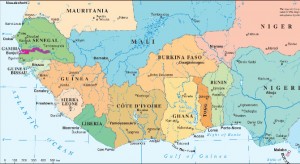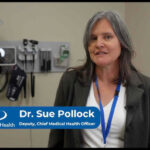Home »

Preliminary tests negative for Ebola
The Ministry of Health and Interior Health are confirming that preliminary testing on a health-care worker returning from West Africa has come back negative for Ebola virus disease (EVD).
In keeping with provincial protocols, public health officials have asked the patient to remain within two hours of a designated type two facility – in this case Kelowna General Hospital – for the duration of the 21-day self-monitoring period.

On Sunday evening, the patient began to experience mild influenza-like illness, and reported those symptoms to the medical health officer.
Working with provincial public health specialists, and out of an abundance of caution, Interior Health asked the patient to come into Kelowna General Hospital to get tested. While there, the patient is being cared for in an isolation room, away from other patients or staff.
Early testing is negative for Ebola and all signs point to this being a case of the flu or a similar illness – influenza is currently circulating widely in the community. However, given travel and work history, public health is following all the standard precautionary procedures, to ensure that they do not have Ebola.
Additional testing will take place over the next day or two to confirm results of early testing. The patient will remain in isolation in hospital during this time.
The risk to the public remains extremely low. Health-care workers at Kelowna General Hospital have been trained on Ebola protocols and procedures, and the facility is fully prepared to manage this patient.
Ebola virus disease preparations in B.C.
The risk to British Columbians from Ebola virus disease (EVD) remains very low.
B.C.’s front-line response has been forged by experiences in managing the SARS outbreak in 2003 and the H1N1 outbreak in 2009. Through these experiences public health agencies developed protocols that are used to identify, isolate and treat any suspected infectious disease, like Ebola.
Infection control systems and procedures in Canadian hospitals are supported by a series of infection control guidelines used across the country, and B.C. emergency rooms and hospitals remain ready to identify, isolate and treat any suspected Ebola cases. In addition, a number of procedures are in place to reduce the risk of travellers returning ill from West Africa, including:
* Comprehensive procedures in place at our borders to identify sick travellers.
* Border Services is asking all returning travellers whether or not they have been to one of the affected West African countries. Those who have are immediately referred to a quarantine officer, who further assesses whether they are at risk of Ebola.
* Any travellers identified as being high risk are given quarantine orders, and local public health is contacted.
Also, all airlines and airport authorities are required to report ill travellers arriving on international flights to the agency’s quarantine officers.
In addition, public health officials here in British Columbia (and across Canada) are working with aid organizations such as the Red Cross, to identify health-care workers who will be travelling to West Africa to aid in the fight against Ebola there. That means that we are able to proactively work with individuals to outline conditions for return, such as remaining within two hours of a designated hospital, and self-monitoring.
B.C. Actions to Date
* B.C. is working very closely with federal, provincial and territorial colleagues to ensure readiness to respond to any potential cases, and B.C.’s Health Minister Terry Lake currently serves as the co-chair of the FPT Ebola Preparedness Group.
* Dr. Perry Kendall is co-chairing a provincial task force with clinical and public health representatives from across all of the health authorities to review our protocols, and continue to prepare for a possible case.
* The task force has prepared and distributed several important guidelines and protocols to health authorities and primary care facilities, including on personal protective equipment use in possible Ebola cases, protocols for assessment both in the community and at emergency departments and on training.
* Each health authority has a dedicated 24/7 number for health-care facilities to contact if they encounter a potential case.
* There are also a number of additional documents and guidelines currently under development by the task force, which will be distributed to health authorities and health care providers very shortly. These include:
o Detailed training guidelines, including donning and doffing posters and training materials;
o Guidance for primary health-care facilities for use when dealing with possible Ebola cases; and
o Clinical care guidelines for managing and treating suspected or confirmed Ebola patients.
* The province has designated two hospitals in the province to serve as centres to treat patients confirmed with having Ebola – Surrey Memorial Hospital for adult patients, and BC Children’s Hospital for pediatric patients.
* The ministry has been holding regular stakeholder engagement teleconferences with key groups, such as health-care unions and colleges, to keep them updated on planning and preparedness.
For more information on Ebola virus disease, visit the BC Centre for Disease Control website at: www.bccdc.ca/dis-cond/a-z/_e/Ebola/default.htm
For information on the guidelines, protocols and procedures for managing and preparing for Ebola in B.C., visit the provincial health officer website at: www.health.gov.bc.ca/pho.
B.C. Ministry of Health







